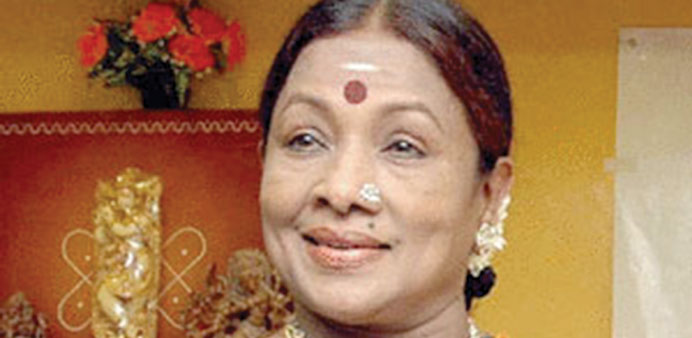ACCOMPLISHED: Manorama performed 1,500-odd films and 1,000 stage plays during her career.
By Gautaman Bhaskaran
The world of cinema has never been an easy place for a woman, and this is true even in free thinking and liberal Europe or America. And, I am not exaggerating when I say that the life of a female star in India is fraught with unpleasant impediments. One can, then, well imagine the plight of a comedienne in cinema — dominated by comedians. So, it has always been rare to find witty women on the Indian screen.
Tamil actress Manorama, who died last Saturday, was one of those rare comediennes who swam superbly in a sea of funny men. She could not have had a cakewalk performing in those 1,500-odd films and 1,000 stage plays (not to mention the innumerable number of television serials and the songs she sang for 300 movies) in a 50-year career that began in 1958 with the Tamil film, Maalayitta Mangai.
And the man responsible for her switch from theatre (which she has been doing since she was just 12) to cinema was poet Kannadasan. Manorama played a comical part in Maalayitta Mangai, and although she did essay the lead in the 1963 Konjum Kumari, she was wise enough to understand that as a heroine her screen life would be quite short.
Kannadasan’s words and his confidence in her ability gave Manorama the first push into a career she began to love like nothing else. Once, Manorama said:” Kannadasan changed my life by casting me in Maalayitta Mangai. It was a witty role, and he trusted me so much and said that I would be able to pull it off. I was very doubtful about it, but he told me, ‘If you are going to act in movies only as a heroine, people here will throw you out of the industry after three or four years, but doing such roles will take you places. And you have the talent, too, to reach higher peaks.’”
This was it, and Manorama took Kannadasan’s advice with all the earnestness it deserved, and the strength she derived from his words helped her to become an icon in south Indian cinema — one who would eventually be known as the Sivaji Ganesh of Comedy.
Manorama acted eye-to-eye and shoulder-to-shoulder with a man as great a comedian as Nagesh, and the pair was a sheer delight to watch. And in a cinema dominated by star comedians like Chandrababu and Thangavelu, she made her own distinct mark with wonderful dexterity.
Manorama’s boldness and courage of conviction were largely the key to her success. In the early 1960s, she once buttonholed Chandrababu, then the king of comedy, and asked him why he was fighting shy of acting with a struggling, upcoming artist like her. The man was shaken all right, but took her question in the right spirit and soon paired with her in Sridhar’s Policekaaran Magal.
Their sizzling chemistry can be seen in the song, Porandhaalum Aambalaiyaa Porakkakoodaathu, with Manorama matching Chandrababu’s graceful style.
Chandrababu did not stay on for long, and when Nagesh stepped into the void, there was Manorama, bright and funny, to foxtrot with him. They worked together in 50 films, like Kanni Thai, Thayin Madiyil, Kadhal Vaganam, Chandrodhyam, Anbee Vaa, Padagotti, Kadhal Vagahnam, Vivasaaye, Thaikku Thalaimagan, Vettikaran, Ther Thiruvizha, Anubhavi Raja Anubhavi, Kungumam, Saraswathi Sabadham, Panjavarnakilli, Navarathiri, Puthiya Paravai, Patthu Matha Bandham and Anbu Karangal.
If there was one movie that may be described as Manorama’s crowning glory, it was the 1968 Thillana Mohanambal, where she portrays Jil Jil Ramamani — the wildly expressive, loud talking but tender hearted woman. Sivaji Ganesh called this role “Manorama’s cornerstone in career”. Indeed it was, and with actors, such as Ganesh, Balaiah and Padmini, Manorama carved a brilliant niche for herself in the film. And there are people even today who remember Manorama in Thillana Mohanambal rather than Sivaji or Padmini!
However, for Manorama, her most favourite and most challenging role was in Unakkum Vazhvu Varum, where a girl talking nineteen-to-a-dozen is forced to play dumb. Which she did opposite another veteran comedian, Thengai Srinivasan.
Later, when Nagesh was embroiled in a criminal case, Manorama distanced herself from him and began to couple with Cho Ramaswamy. Their Bommalaattam brought the best out of them, with Manorama lisping the classic Madras slang. “Vaa Vaathyaare Voottaande” (Come man, come home) was a sentence that was a hit with the masses.
Manorama had this ability to speak just about every Tamil dialect with amazing precision. This was vouched for by no less a luminary than Ganesh, who told his wife once that no one can do better than Manorama when it came to speaking different Tamil dialects. Which helped her throughout her career — even later when she essayed a mother or grandmother, roles she performed with a touch of rib-tickling humour.
For one, who made us all laugh, Manorama did not have a happy childhood. Born Gopishanta to Kasi Kilakudaiyar and Ramamirtham in Tamil Nadu’s Mannargudi, Manorama was shunned by her father, who was craving for a male heir. He asked his wife to leave, and Ramamirtham worked as maid to raise her daughter. The mother would have loved to see Manorama study medicine and don the white coat. But there was no money for that, a penury which pushed Manorama on to the stage at the tender age of 12.
There was little joy in Manorama’s personal life even later. She fell in love with the manager of her drama troupe, Ramanathan, and married him in 1964, but the union lasted barely two years, producing though a son. Interestingly, her grandson is a doctor, and Manorama was happy that her mother’s wish came true at least in this way.
♦ Gautaman Bhaskaran has been
writing on Indian and world cinema for over three decades, and may be emailed at [email protected]

